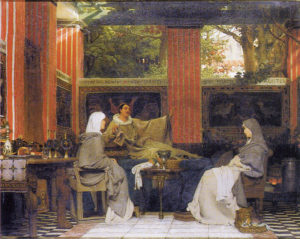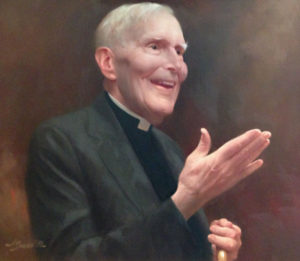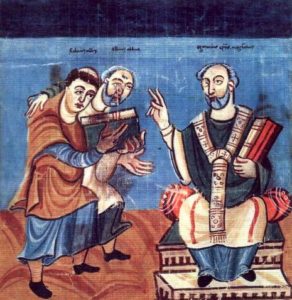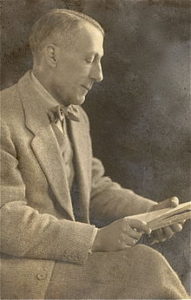Mount Calvary Church
Personal Ordinariate of the Chair of St. Peter
Pentecost
June 4, 2017
Hymns
Hail thee, festival day!
Father, we thank Thee who hast planted
Come, Holy Ghost, Creator blest
Anthems
Veni, Sancte Spiritus, Eric Spengler
Factus est repente, Eric Spengler
Common
An Anglican Folk Mass, Martin Shaw
_________________________
Venantius reading his poetry to Queen Radegund, Lawrence Alma-Tadema
The refrain of Hail thee, festival day! comes from the 20th couplet of Venantius Fortunatus’ (c. 540—c. 600) long Latin poem (110 lines!) celebrating the conversion of the Saxons by Felix, Bishop of Nantes (c. 582): Salve feste dies toto venerabilis aevo. Venantius, who traveled around the Germanic kingdoms of Europe as a wandering minstrel, devoted his life to the cause of Christian literary elegance. As poet to the Merovingian court, he became a friend of the mystic Queen Radegund, and he later became Bishop of Poitiers.
Ralph Vaughan Williams composed the tune Salve festa dies for the translation by Maurice Frederick Bell, both done for the 1906 English Hymnal. Vaughan Williams’ music adds a regal manner to its religiosity, thereby bearing a resemblance to much English church music from the nineteenth century, but also demonstrating the composer’s vigor in its march-like gait. The main theme is glorious and celebratory without ever veering into a secular sound or mood.
Here at St. John’s, Detroit, is the Pentecost section of Hail thee festival day.
___________________
Father, we thank thee who hast planted is a translation by the Episcopal poet and presbyter Francis Bland Tucker (1896—1984; UVA 1914) of a portion of the Didache (c. 110 AD) that describes the manner of celebrating the Eucharist: “concerning the broken bread. We thank thee, our Father, for the life and knowledge which thou hast made known unto us through Jesus thy Son; to thee be the glory forever. As this broken bread was once scattered on the mountains, and after it had been brought together became one, so may thy Church be gathered together from the ends of the earth unto thy kingdom.” Some scholars think these prayers may even predate many of the writings of the New Testament.
Again at St. John’s, Detroit, before a Tigers game. A slower and more delicate version.
F. Bland Tucker
Francis Bland Tucker is an important figure in hymnody. He was educated at the University of Virginia and the Virginia Theological Seminary. Beginning in 1945, he was Rector of Christ Church in Savannah, Georgia. Tucker served on the two commissions, forty-two years apart, that revised hymnals of the Episcopal Church. He worked on the 1940 Hymnal. The 1982 Hymnal which includes 17 of Tucker’s contributions. Among these are the texts, Oh, Gracious Light (Hymns 25-26), Father, We Thank Thee Who Hast Planted (Hymns 302-303), and his original text, Our Father, by Whose Name (Hymn 587). Only John Mason Neale is credited with more items in the 1982 Hymnal. Tucker was also a theological advisor to the commission that produced the 1979 Book of Common Prayer.
A collateral descendant of George Washington, Tucker’s parents were Beverley Dandridge Tucker, Episcopal Bishop of Southern Virginia, and Anna Maria Washington who was one of the last children to be born at Mount Vernon.
Francis Bland is the brother of Henry St. George Tucker (1874–1959), 19th Presiding Bishop of the Episcopal Church and descendant of St. George Tucker (1752–1827), lawyer, legal scholar, state and federal judge for whom the St. George Tucker House in Colonial Williamsburg is named.
__________________
Come, Holy Ghost, Creator blest is a translation of Veni creator spiritus, generally attributed to Rabanus Maurus (776—856). Of him, Pope Bendict XVI says “In Rabanus Maurus…is shown an extraordinary awareness of the need to involve, in the experience of faith, not only the mind and the heart but also the senses through those other aspects of aesthetic taste and human sensitivity that lead man to benefit from the truth with his whole self, ‘mind, soul, and body.’ This is important: faith is not only thought but also touches the whole of our being.”
___________________
Anthems
Eric Spengler has composed two original pieces for Mount Calvary for Pentecost.
Veni, Sancte Spiritus, a setting of the sequence for Pentecost
Veni Sancte Spiritus et emitte caelitus lucis tuae radium. Veni pater pauperum, veni dator munerum, veni lumen cordium.
2) Consolator optime, dulcis hospes animae, dulce refrigerium. In labore requies, in aestu temperies, in fletu solacium.
3) O lux beatissima, reple cordis intima tuorum fidelium. Sine tuo numine nihil est in homine, nihil est innoxium.
4) Lava quod est sordidum, riga quod est aridum, sana quod est saucium. Flecte quod est rigidum, fove quod est rigidum, rege quod est devium.
5) Da tuis fidelibus in te confidentibus sacrum septenarium. Da virtutis meritum, da salutis exitum, da perenne gaudium. Amen. Alleluia.
Come, Holy Spirit, and send down from heaven the ray of your light. Come, father of the poor, come, giver of gifts, come, light of the hearts.
2) Best consoler, sweet host of the soul, sweet refresher. Rest in work, cooling in heat, comfort in crying.
3) O most blessed light, fill the innermost hearts of your faithful. Without your power nothing is in man, nothing innocent.
4) Clean what is dirty, water what is dry, heal what is wounded. Bend what is rigid, heat what is cold, lead what has gone astray.
5) Grant to your faithful who trust in you, your sevenfold holy gift. Grant us the reward of virtue, grant us final salvation, grant us eternal joy.
and
Factus est repente, a setting of the Communion antiphon for Pentecost
Factus est repente de coelo sonus, tamquam advenientis spiritus vehementis ubi erant sedentes, alleluia; et repleti sunt omnes Spiritu Sancto, loquentes magnalia Dei, alleluia, alleluia.
Suddenly there came a sound from heaven, as of a mighty wind coming where they were sitting, alleluia; and they were all filled with the Holy Spirit, speaking the wonderful works of God, alleluia, alleluia
____________________
An Anglican Folk Mass, Martin Shaw
Here is the Creed as sung at Chichester Cathedral.
Martin Edward Fallas Shaw (1875 – 1958) was an English composer, conductor and (in his early life) theatre producer. His over 300 published works include songs, hymns, carols, oratorios, several instrumental works, a congregational mass setting (the Anglican Folk Mass) and four operas including a ballad opera.
He was the son of the Bohemian and eccentric James Shaw, composer of church music and organist of Hampstead Parish Church. He was the elder brother of the composer and influential educator Geoffrey Shaw and the actor Julius Shaw, whose career was cut short by the First World War – he was killed in March 1918. He studied under Stanford at the Royal College of Music, together with a generation of composers that included Holst, Vaughan Williams and John Ireland. He then embarked upon a career as a theatrical producer, composer and conductor, the early years of which he described as “a long period of starving along”. However, he began his career as an organist, serving at Emmanuel Church, West Hampstead, from 1895 to 1903.
Working with Percy Dearmer, Martin was music editor of The English Carol Book (1913, 1919) and, with Ralph Vaughan Williams, of Songs of Praise (1925, 1931) and The Oxford Book of Carols (1928). His tune Little Cornard is sung to Hills of the North Rejoice, and Marching is sung to Through the Night of Doubt and Sorrow. While doing research for the English Hymnal (1906) in the British Library, he came upon the traditional Gaelic hymn-tune Bunessan in L. McBean’s Songs and Hymns of the Gael, published in 1900. However, the tune was not included in the English Hymnal. It was used instead in the second edition of Songs of Praise (1931), set to the poem Morning Has Broken, which Martin Shaw commissioned specially from his old friend Eleanor Farjeon. This tune and words became a No. 1 hit for Cat Stevens in 1972. Martin Shaw also noted down the Czech carol Rocking and included it in The Oxford Book of Carols.



